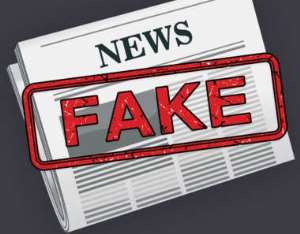
Fake news is a growing menace to democratic elections in Ghana and other democracies by relentless targeting of hyper-partisan views, which play to the fears and prejudices of people, in order to influence their voting plans and their behavior. In Ghana today, it's nearly impossible to consume online and social media content without coming across fake news. It's seen in every nook and cranny of the society.
Even though fake news has been part and parcel of our ecosystem from time immemorial with its long history traceable to satires (humor), it has now assumed the proportion of fabrications, concoctions, inventions, dangerous and irresponsible content. In times like this when Ghana is preparing for a major presidential and parliamentary elections, the issue of fake news has become prevalent in the online news media environment posing serious threat and danger to our democracy.
There's vast production of political propaganda and fake news by political actors with clandestine ambitions to paint opponents black and win for themselves public favor. And as usual, we're inundated with avalanche of fake news from the major political parties, the National Democratic Congress (NDC) and the New Patriotic Party (NPP).
Recently, there has been an upsetting increase in the spread of fake news related to our politics and even the Covid-19 and that is very appalling and terrifying. For example, the NPP some weeks ago accused the NDC of creating websites to misinform Ghanaians and causing disaffection for the governing party.
In case you were oblivious of the news, the Deputy Campaign Manager of the NPP, Mustapha Hamid called on Ghanaians to disregard the opposition NDCs' plans to cause fear and panic in the country. According to Mr. Hamid, the NDC has developed a number of pseudo websites, purposely to generate fake news, misinform electorates and dent the image of the NPP government.
In the same vein, the NDC in the Bono Region also accused the NPP as being behind what they described as fake news about the registration of foreigners in the just ended Voter Registration exercise in the country. Another instance, the news about the Presidency issuing an official release to discredit a fake news that he had initiated processes to legalise homosexuality in this country still remains fresh in our minds.
We live in an era where some citizens have become their own journalists, posting and tweeting their own news, to the detriment of our nation. Honestly, it is hard to accept this, but we must all make concerted efforts to eliminate this phenomenon from our media space. Difficult though, that might be, the health of the nation requires that we must succeed.
I believe that the traditional media should position themselves as authenticators of true news from fake ones. Since, the social media is so much engulfed with fake news, the traditional media, involving radio, television, newspapers and the wire service should become the reference points for authentic news.
There's no denying the fact that, the traditional media also reproduced fake news which were showcased on the social media platforms without verifying to the disservice of the public. We find ourselves in the era of 'disinformenia' where there's 'disinfodemic' and therefore, it is important for the traditional media to be media and information literate. Media practitioners must uphold the highest journalistic standards, ethics and values in their reportage of the electoral processes and activities.
The media has a role to play in the December 7, presidential and parliamentary elections. Journalists should do well to quell fake news and be able to sensitise the public on how to discern what is and was the truth, as well as educate them to exhibit appropriate behavior of not passing on falsehoods and injurious information.
As a nation, let us do everything in our power to maintain the enviable reputation we have so far established as one of Africa’s leading countries whose democratic development is a shining path/beacon for others to follow. For more than a quarter of a century, Ghana has become an island of peace and stability in a sub-region threatened by terrorism, insurgence and armed conflict, and socio-political instability.
We should, however, not be complacent at all. The past experiences of seven relatively peaceful and credible presidential and parliamentary elections were the result of very hard work and commitment to the noble values of politics and democracy. Of late, unfortunately, there are worrying sources of tension that require the entire nation to take up the grave responsibility of ensuring free, fair and peaceful elections come December 7, 2020.
The author, Bright Philip Donkor is the ILAPI, AJEOT 2020 Best Article Writer; a Young Activist, Political and Social Commentator, Columnist and a Prolific Feature Writer.
Email- [email protected]




 Tuesday’s downpour destroys ceiling of Circuit Court '8' in Accra
Tuesday’s downpour destroys ceiling of Circuit Court '8' in Accra
 SOEs shouldn't compromise on ethical standards, accountability – Akufo-Addo
SOEs shouldn't compromise on ethical standards, accountability – Akufo-Addo
 Father of 2-year-old boy attacked by dog appeals for financial support
Father of 2-year-old boy attacked by dog appeals for financial support
 Jubilee House National Security Operative allegedly swindles businessman over sa...
Jubilee House National Security Operative allegedly swindles businessman over sa...
 Nobody can order dumsor timetable except Energy Minister – Osafo-Maafo
Nobody can order dumsor timetable except Energy Minister – Osafo-Maafo
 Mahama wishes National Chief Imam as he clock 105 years today
Mahama wishes National Chief Imam as he clock 105 years today
 J.B.Danquah Adu’s murder trial: Case adjourned to April 29
J.B.Danquah Adu’s murder trial: Case adjourned to April 29
 High Court issues arrest warrant for former MASLOC Boss
High Court issues arrest warrant for former MASLOC Boss
 Align academic curriculum with industry needs — Stanbic Bank Ghana CEO advocates
Align academic curriculum with industry needs — Stanbic Bank Ghana CEO advocates
 Election 2024: We'll declare the results and let Ghanaians know we've won - Manh...
Election 2024: We'll declare the results and let Ghanaians know we've won - Manh...
